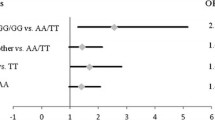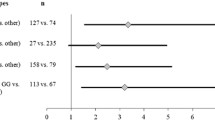Abstract
Single nucleotide polymorphisms (SNP) in repair gene DNA such as XPC gene can reduce the DNA repair capacity (DRC). Reduced DRC induce genetic instability and may increase the susceptibility to prostate cancer (PC). We conducted a case-controls study to examine the relationship between XPC Lys939Gln and XPC-PAT polymorphisms and the risk for prostate cancer in Tunisian population. We have also correlated molecular results with clinical parameters (Gleason score and TNM status) and lifestyle factors (tobacco status, alcohol consumption, and exposition to professional risk factors) of prostate cancer patients. We have found that the XPC Lys939Gln polymorphism was not associated with a risk of prostate cancer. However the XPC PAT I/I genotype was found to be associated with 3.83-fold increased risk of prostate cancer compared to controls (p = 0.00006; OR 3.83; 95% CI (1.83–8.05)). The test of linkage disequilibrium showed that XPC-PAT polymorphism is in linkage disequilibrium with XPC Lys939Gln variants. The combined analysis of XPC Lys939Gln and XPC-PAT variants showed that patients who inherited (Lys/Gln + PAT D/D) genotypes were protected against prostate cancer development compared to controls. In the other hand, no significant association has been found between XPC polymorphisms and clinical parameters or between XPC polymorphisms and lifestyle factors.
Similar content being viewed by others
Data availability
Data sharing not applicable to this article as no datasets were generated or analyzed during the current study.
Abbreviations
- SNP:
-
Single nucleotide polymorphisms
- DRC:
-
DNA repair capacity
- PC:
-
Prostate cancer
- PSA:
-
Prostate-specific antigen
- NER:
-
Nucleotide excision repair
- BER:
-
Base excision repair
- MMR:
-
Mismatch repair
- DSBR:
-
Double-strand break repair
- TCR:
-
Transcription-coupled repair
- XPC:
-
Xeroderma pigmentosum complementary group C
- DRE:
-
Digital rectal examination
- EDTA:
-
Ethylene diamine tetra-acetic acid
- PCR:
-
Polymerase chain reaction
- PCR-RFLP:
-
Restriction Fragment Length polymorphism
- ORs:
-
Odds ratios
- CI:
-
Confidence intervals
References
Bello AP, Masip TC (2014) Prostate cancer epidemiology. Arch Esp de Urol 67(5):373–382
Curado MP, Shin HR, Storm H, Heanue M, Boyle P (2007) Cancer incidence in five continents IARC scientific publications
Forrest MS, Edwards SM, Houlston R, Kote-Jarai Z, Key T, Allen N, Knowles MA, Turner F, Ardern-Jones A, Murkin A, Williams S, Oram R, collaborators C-UBUpcs, Bishop DT, Eeles RA (2005) Association between hormonal genetic polymorphisms and early-onset prostate cancer. Prostate Cancer Prostat Dis 8:95. https://doi.org/10.1038/sj.pcan.4500785
Gong Z, Agalliu I, Lin DW, Stanford JL, Kristal AR (2008) Cigarette smoking and prostate cancer-specific mortality following diagnosis in middle-aged men. Cancer Causes Control: CCC 19(1):25–31. https://doi.org/10.1007/s10552-007-9066-9
Gong Z, Kristal AR, Schenk JM, Tangen CM, Goodman PJ, Thompson IM (2009) Alcohol consumption, finasteride, and prostate cancer risk: results from the prostate cancer prevention trial. Cancer 115(16):3661–3669. https://doi.org/10.1002/cncr.24423
Rozet F, Hennequin C, Beauval JB, Beuzeboc P, Cormier L, Fromont G, Mongiat-Artus P, Ouzzane A, Ploussard G, Azria D, Brenot-Rossi I, Cancel-Tassin G, Cussenot O, Lebret T, Rebillard X, Soulié M, Renard-Penna R, Méjean A (2016) Recommandations en onco-urologie 2016–2018 du CCAFU: cancer de la prostate. Progrès en Urol 27:S95–S143. https://doi.org/10.1016/s1166-7087(16)30705-9
He J, Shi TY, Zhu ML, Wang MY, Li QX, Wei QY (2013) Associations of Lys939Gln and Ala499Val polymorphisms of the XPC gene with cancer susceptibility: a meta-analysis. Int J Cancer 133(8):1765–1775. https://doi.org/10.1002/ijc.28089
Liu Y, Wang H, Lin T, Wei Q, Zhi Y, Yuan F, Song B, Yang J, Chen Z (2012) Interactions between cigarette smoking and XPC-PAT genetic polymorphism enhance bladder cancer risk. Oncol Rep 28(1):337–345. https://doi.org/10.3892/or.2012.1759
Brown KL, Roginskaya M, Zou Y, Altamirano A, Basu AK, Stone MP (2010) Binding of the human nucleotide excision repair proteins XPA and XPC/HR23B to the 5R-thymine glycol lesion and structure of the cis-(5R,6S) thymine glycol epimer in the 5′-GTgG-3′ sequence: destabilization of two base pairs at the lesion site. Nucleic Acids Res 38(2):428–440. https://doi.org/10.1093/nar/gkp844
Jiang X, Zhou L-t, Zhang S-c, Chen K (2012) XPC polymorphism increases risk of digestive system cancers: current evidence from A meta-analysis. Chin J Cancer Res 24(3):181–189. https://doi.org/10.1007/s11670-012-0181-0
Zhu Y, Yang H, Chen Q, Lin J, Grossman HB, Dinney CP, Wu X, Gu J (2008) Modulation of DNA damage/DNA repair capacity by XPC polymorphisms. DNA Repair 7(2):141–148. https://doi.org/10.1016/j.dnarep.2007.08.006
Marin MS, Lopez-Cima MF, Garcia-Castro L, Pascual T, Marron MG, Tardon A (2004) Poly (AT) polymorphism in intron 11 of the XPC DNA repair gene enhances the risk of lung cancer. Cancer Epidemiol, Biomark Prev 13 (11 Pt 1):1788–1793
Qiao Y, Spitz MR, Shen H, Guo Z, Shete S, Hedayati M, Grossman L, Mohrenweiser H, Wei Q (2002) Modulation of repair of ultraviolet damage in the host-cell reactivation assay by polymorphic XPC and XPD/ERCC2 genotypes. Carcinogenesis 23(2):295–299
Sak SC, Barrett JH, Paul AB, Bishop DT, Kiltie AE (2005) The polyAT, intronic IVS11-6 and Lys939Gln XPC polymorphisms are not associated with transitional cell carcinoma of the bladder. Br J Cancer 92(12):2262–2265. https://doi.org/10.1038/sj.bjc.6602616
Zhang L, Zhang Z, Yan W (2005) Single nucleotide polymorphisms for DNA repair genes in breast cancer patients. Clin Chim Acta 359(1–2):150–155. https://doi.org/10.1016/j.cccn.2005.03.047
Hirata H, Hinoda Y, Tanaka Y, Okayama N, Suehiro Y, Kawamoto K, Kikuno N, Majid S, Vejdani K, Dahiya R (2007) Polymorphisms of DNA repair genes are risk factors for prostate cancer. Eur J Cancer (Oxford, England 1990) 43(2):231–237. https://doi.org/10.1016/j.ejca.2006.11.005
Wu H, Lv Z, Wang X, Zhang L, Mo N (2015) Lack of association between XPC Lys939Gln polymorphism and prostate cancer risk: an updated meta-analysis based on 3039 cases and 3253 controls. Int J Clin Exp Med 8(10):17959–17967
Mirecka A, Paszkowska-Szczur K, Scott RJ, Gorski B, van de Wetering T, Wokolorczyk D, Gromowski T, Serrano-Fernandez P, Cybulski C, Kashyap A, Gupta S, Golab A, Slojewski M, Sikorski A, Lubinski J, Debniak T (2014) Common variants of xeroderma pigmentosum genes and prostate cancer risk. Gene 546(2):156–161. https://doi.org/10.1016/j.gene.2014.06.026
Zou Y-F, Tao J-H, Ye Q-L, Pan H-F, Pan F-M, Su H, Ye D-Q (2013) Association of XPC gene polymorphisms with susceptibility to prostate cancer: evidence from 3936 subjects. Genet Test Mol Biomark 17(12):926–931. https://doi.org/10.1089/gtmb.2013.0267
Evans GA (1990) Molecular cloning: a laboratory manual. 2nd edn. Volumes 1, 2, and 3. Current protocols in molecular biology. Cell 61 (1):17–18. https://doi.org/10.1016/0092-8674(90)90210-6
Excoffier L, Laval G, Schneider S (2005) Arlequin (version 3.0): an integrated software package for population genetics data analysis. Evol Bioinf Online 1:47–50
Agalliu I, Kwon EM, Salinas CA, Koopmeiners JS, Ostrander EA, Stanford JL (2010) Genetic variation in DNA repair genes and prostate cancer risk: results from a population-based study. Cancer Causes Control 21(2):289–300. https://doi.org/10.1007/s10552-009-9461-5
Yoshino Y, Takeuchi S, Katoh T, Kuroda Y (2016) XPC intron11 C/A polymorphism as a risk factor for prostate cancer. Environ Health Prev Med 21(2):100–104. https://doi.org/10.1007/s12199-015-0505-z
Dai QS, Hua RX, Zhang R, Huang YS, Hua ZM, Yun CT, Zeng RF, Long JT (2013) Poly (AT) deletion/insertion polymorphism of the XPC gene contributes to urinary system cancer susceptibility: a meta-analysis. Gene 528(2):335–342. https://doi.org/10.1016/j.gene.2013.06.092
Mandal RK, Gangwar R, Kapoor R, Mittal RD (2012) Polymorphisms in base-excision and nucleotide-excision repair genes and prostate cancer risk in north Indian population. Indian J Med Res 135:64–71
Mittal RD, Mandal RK (2012) Genetic variation in nucleotide excision repair pathway genes influence prostate and bladder cancer susceptibility in North Indian population. Indian J Hum Genet 18(1):47–55. https://doi.org/10.4103/0971-6866.96648
Wu X, Gu J, Grossman HB, Amos CI, Etzel C, Huang M, Zhang Q, Millikan RE, Lerner S, Dinney CP et al (2006) Bladder cancer predisposition: a multigenic approach to DNA-repair and cell-cycle-control genes. Am J Hum Genet 78(3):464–479
Zhu Y, Lai M, Yang H, Lin J, Huang M, Grossman HB, Dinney CP, Wu X (2007) Genotypes, haplotypes and diplotypes of XPC and risk of bladder cancer. Carcinogenesis 28(3):698–703
Kahnamouei SA, Narouie B, Sotoudeh M, Mollakouchekian MJ, Simforoosh N, Ziaee SA, Samzadeh M, Afshari M, Jamaldini SH, Imeni M, Hasanzad M (2016) Association of XPC Gene Polymorphisms with Prostate Cancer Risk. Clin Lab 62(6):1009–1015
Acknowledgements
The team work would like to express their thanks and gratitude to the medical team of Urology department, Charles Nicolle Hospital, Tunis—Tunisia.
Author information
Authors and Affiliations
Corresponding author
Ethics declarations
Conflict of interest
The authors declare that they have no conflict of interest.
Ethics approval
This project was approved by a Charles Nicolle ethical committee, Tunis; Tunisia.
Informed consent
Informed consent was obtained from all individual participants included in the study.
Additional information
Publisher's Note Springer Nature remains neutral with regard to jurisdictional claims in published maps and institutional affiliations.
Rights and permissions
About this article
Cite this article
Said, R., Bougatef, K., Setti Boubaker, N. et al. Polymorphisms in XPC gene and risk for prostate cancer. Mol Biol Rep 46, 1117–1125 (2019). https://doi.org/10.1007/s11033-018-4572-2
Received:
Accepted:
Published:
Issue Date:
DOI: https://doi.org/10.1007/s11033-018-4572-2




